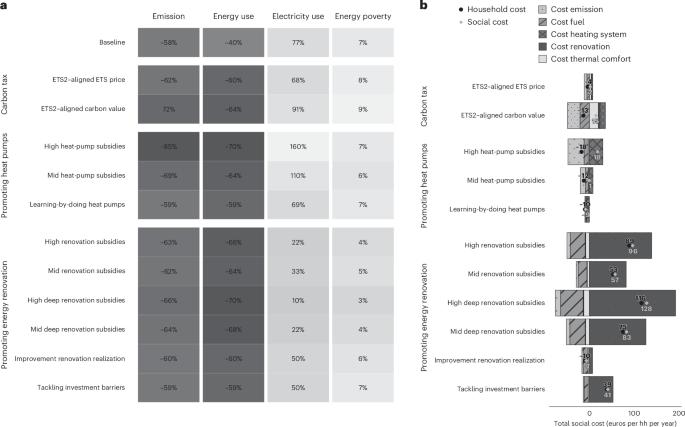Meeting climate target with realistic demand-side policies in the residential sector
IF 27.1
1区 地球科学
Q1 ENVIRONMENTAL SCIENCES
引用次数: 0
Abstract
The European Union (EU) has established an ambitious policy framework for demand-side mitigation in buildings towards net-zero targets. Here, we conduct a comprehensive quantitative assessment of 384 demand-side policy combinations for residential space heating that complement supply-side decarbonization efforts. We show that implementing the EU Emissions Trading System 2, even when combined with energy supply decarbonization, falls short of climate targets. Beyond the EU Emissions Trading System 2, we emphasize the need for ambitious heat-pump subsidies as a critical component of a successful strategy. Conversely, a large-scale generic ‘Renovation Wave’ contributes modestly to decarbonization, is not a cost-effective strategy at the EU level and requires significant public spending increases. We advocate for the implementation of a carbon tax, paired with substantial heat-pump subsidies and targeted incentives for home insulation by country and building. This approach supports the decarbonization of the residential sector, limits the strain on the electricity grid and alleviates energy poverty. Decarbonizing the residential sector is essential for net-zero targets, and the EU has established ambitious policy packages with various instruments. This research shows that beyond carbon trading programmes, massive heat-pump subsidies and targeted energy renovation incentives are needed.


以切合实际的住宅需求侧政策实现气候目标
欧洲联盟(欧盟)制定了一个雄心勃勃的政策框架,以缓解建筑物的需求,实现净零排放目标。在这里,我们对384个住宅空间供暖的需求侧政策组合进行了全面的定量评估,这些政策组合补充了供给侧的脱碳努力。我们表明,实施欧盟排放交易体系2,即使与能源供应脱碳相结合,也达不到气候目标。除了欧盟排放交易体系2之外,我们强调需要雄心勃勃的热泵补贴,这是成功战略的关键组成部分。相反,大规模的通用“革新浪潮”对脱碳的贡献不大,在欧盟层面上不是一个具有成本效益的战略,需要大幅增加公共支出。我们主张征收碳税,同时对热泵提供大量补贴,并按国家和建筑对住宅隔热进行有针对性的激励。这种方法支持住宅部门的脱碳,限制电网的压力,减轻能源贫困。
本文章由计算机程序翻译,如有差异,请以英文原文为准。
求助全文
约1分钟内获得全文
求助全文
来源期刊

Nature Climate Change
ENVIRONMENTAL SCIENCES-METEOROLOGY & ATMOSPHERIC SCIENCES
CiteScore
40.30
自引率
1.60%
发文量
267
审稿时长
4-8 weeks
期刊介绍:
Nature Climate Change is dedicated to addressing the scientific challenge of understanding Earth's changing climate and its societal implications. As a monthly journal, it publishes significant and cutting-edge research on the nature, causes, and impacts of global climate change, as well as its implications for the economy, policy, and the world at large.
The journal publishes original research spanning the natural and social sciences, synthesizing interdisciplinary research to provide a comprehensive understanding of climate change. It upholds the high standards set by all Nature-branded journals, ensuring top-tier original research through a fair and rigorous review process, broad readership access, high standards of copy editing and production, rapid publication, and independence from academic societies and other vested interests.
Nature Climate Change serves as a platform for discussion among experts, publishing opinion, analysis, and review articles. It also features Research Highlights to highlight important developments in the field and original reporting from renowned science journalists in the form of feature articles.
Topics covered in the journal include adaptation, atmospheric science, ecology, economics, energy, impacts and vulnerability, mitigation, oceanography, policy, sociology, and sustainability, among others.
 求助内容:
求助内容: 应助结果提醒方式:
应助结果提醒方式:


